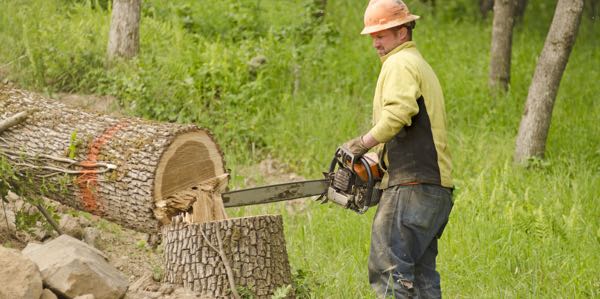What is a Faller?
A faller is a logging worker, part of an industry that harvests millions of trees each year around the world. Throughout history the profession was known as the lumberjack and the image of a burly man in chainsaw boots, checkered flannel shirt and suspenders forms part of legend and popular culture. Lumberjacks were heros in folklore and fairy tales, such as Paul Bunyan and Little Red Riding Hood, and there are many lumberjack songs in early American and traditional Irish and Scottish music. In the past the lumberjack did dangerous and primitive work, but had the reputation of being exceptionally strong, masculine, and able to confront any kind of danger.
Without fallers we would have no raw materials to make wood products that are so important to our construction industry and our daily lives. Although the work is repetitious, falling trees by hand involves a high degree of specialized skill and concentration, and a commitment to make safety part of every work day. Logging has a reputation as being hazardous, but recent technological advancements have reduced many of the risks. In addition to chainsaws, feller-buncher operators, for example, use machines that are like backhoes to cut trees at the base and pile them up. Although the profession has traditionally been restricted to men, many women are now becoming fallers.
What does a Faller do?

The faller's job involves cutting down trees. This is done with mobile felling machines or with hand-held chain saws. For the most part a crew will consist of one or two fallers, a log cutter, and several equipment operators who remove the trees and load them. Fallers generally stick to their job of cutting, although they may also assist with other tasks the crew is responsible for, such as putting chains around logs so they can be dragged to another location by the tractors, or driving the tractors. Once trees are cut by the fallers they must be separated by species so they can be taken to the tree harvesters and cut.
A faller must understand sound forestry practices and have a good working knowledge of local harvesting rules and regulations. They need to be able to accurately identify tree species, and know how to use efficient felling and logging techniques. Because the work is done outside and subject to weather conditions, it is also important to understand how felling methods need to be adapted to fit local circumstances, whatever they might be. Finally, a faller must understand and do his or her utmost to meet environmental practice standards.
What is the workplace of a Faller like?
Work is done outdoors, often in isolated locations, and many times bad weather is a factor. Workers must commute long distances or live in work camps for long periods of time. Shift work is common. Although technology has made improvements, there are constant hazards in the workplace. Some are associated with the hard physical nature of the job itself, others involve falling branches, rough terrain, and the inherent dangers of felling trees and handling logs - known traditionally in the industry as "widowmakers."
Machinery noise means protective gear must be used on the ears, and other safety equipment, including hardhats, boots, and safety clothing must be worn. Trees may be cut on steep, wet and uneven terrain, and workers may have to lift heavy loads. There is a degree of uncertainty in the workplace, as competition in the industry and cheaper harvest costs overseas impact the availability of work in North America. Demand for wood products remains high worldwide, however, so work is available in many countries outside of the U.S. and Canada. Finland, Switzerland, Indonesia, New Zealand, Brazil, and Malaysia are just a few of the countries with a large lumber industry. The annual world logging competitions draw skilled lumberjacks from dozens of countries around the world.
Fallers are also known as:
Timber Faller
Tree Faller
Timber Cutter
Logger
Tree Feller